Ghost in the Shell (1995): What makes us humans? | ¿Qué nos hace humanos?
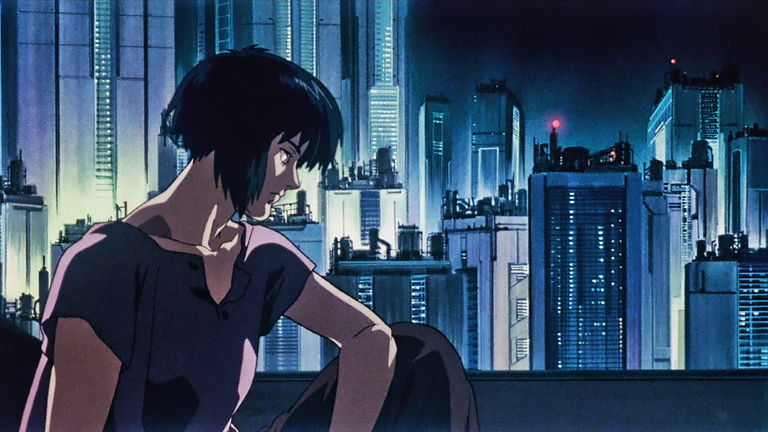
Basada en el manga de Masamune Shirow
I must confess that I'm not a fan of manga or anime based on them. Yes, as a child I watched many episodes of Dragon Ball and Saint Seiya, but more because they were available on national television than out of any love for the genre. As an adult, I only remember watching the entire Death Note, but no other anime series. Now, I've seen many Japanese animated films—beyond Ghibli—and I recognize the talent of the creators and the interesting nature of some of the stories, but I'm too low an otaku to understand many references. So, how did I end up seeing this film? Well, once again, it was thanks to MUBI.
Debo confesar que no soy fan de los mangas ni los animes basados en ellos. Sí, siendo niño vi muchos episodios de Dragon Ball o de Los Caballeros del Zodiaco, pero más porque era lo disponible en la televisión nacional que por afición al género. De grande sólo recuerdo haber visto Death Note completa, pero ninguna otra serie de anime. Ahora bien, sí he visto muchas películas de animación japonesa - más allá de Ghibli - y reconozco el talento de los creadores y lo interesante de algunas historias, pero tengo un nivel muy bajo de otaku para conocer muchas referencias. Entonces, ¿cómo llegué a ver esta película? pues, una vez más fue gracias a MUBI.
My favorite streaming platform specializes in international films, independent films, and a curation based on film festivals around the world, but they cover many genres and many eras, so despite its limited offering - limited compared to Netflix or Prime, but enough for any cinephile - there's a bit of everything and they recently uploaded two Japanese animation classics: Akira (which I will watch soon) and Kokaku Kidotai, better known as Ghost in the Shell. Set in the 21st century - in which we live now - the film is at first glance a futuristic thriller about international terrorism, espionage, corporate conspiracies and government secrets, but deep down it's so much more. There are several characters relevant to the plot, but the protagonist is Motoko Kusanagi, an officer in charge of covert operations for Public Security who specializes in technological crimes and what they call cyber-terrorism. In the film's universe, technological advancement has allowed for the creation of 100% artificial cyborgs, as well as the implantation of cybernetic parts in human bodies to make them faster, stronger, smarter, etc.; some completely organic humans still exist, but the vast majority possess some artificial component, which has increased not only the capabilities of the "good guys" but also those who want to do harm. That's why the work of Section 9, the force to which Kusanagi belongs, is so important.
Mi plataforma de streaming favorita se especializa en películas internacionales, cine independiente y una curaduría basada en festivales de cine alrededor del mundo, pero abarcan muchos géneros y muchas épocas, así que a pesar de su limitada oferta - limitada en comparación con Netflix o Prime, pero suficiente para cualquier cinéfilo - hay de todo un poco y recientemente subieron dos clásicos de la animación japonesa: Akira (que voy a ver pronto) y Kokaku Kidotai, mejor conocida como Ghost in the Shell. Ambientada en el siglo XXI - en el cual vivimos ahora - la película es a primera vista un thriller futurista sobre terrorismo internacional, espionaje, conspiraciones corporativas y secretos gubernamentales, pero en el fondo es mucho más. Hay varios personajes relevantes para la trama, pero la protagonista es Motoko Kusanagi, una oficial encargada de operaciones encubiertas de Seguridad Pública que se especializa en crímenes tecnológicos y lo que llaman cyber-terrorismo. En el universo de la película, el avance de la tecnología ha permitido la creación de cyborgs cien por cien artificiales, además de la implantación de partes cibernéticas en cuerpos humanos para hacerlos más rápidos, más fuertes, más inteligentes, etc; aún quedan humanos completamente orgánicos, pero la gran mayoría posee algún componente artificial, lo que ha aumentado no sólo la capacidad de los buenos sino también de aquellos que quieren hacer daño. Por eso es tan importante la labor de la Sección 9, cuerpo al que pertenece Kusanagi.
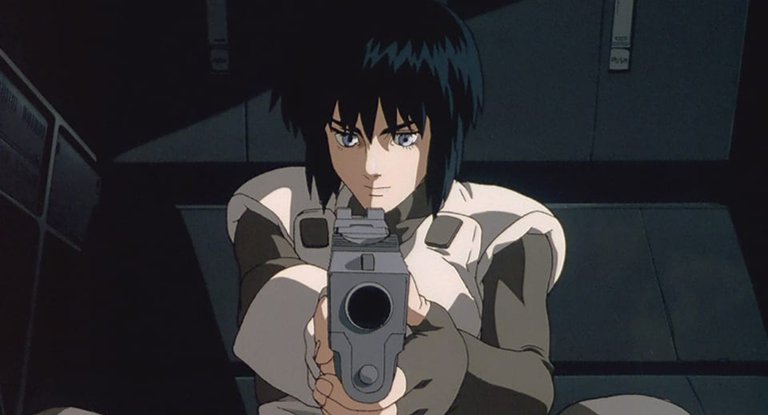
She herself is a cyborg with an artificial body and a super-developed mind that allows her to analyze many things and perform tasks unthinkable for a normal human being, which gives a certain philosophical tinge to the plot. And the story of Ghost in the Shell can be a bit complicated to explain and understand: it's a lot of information in a short time and there are many terms that are specific to the film's universe, so you have to pay close attention to what is mentioned, names, positions, laws, etc.; but in my opinion, the most relevant thing is not so much following the sequence of actions as the implications of them and, above all, the questions Kusanagi herself asks.
Ella misma es un cyborg que posee un cuerpo artificial y una mente super desarrollada que le permite analizar muchas cosas y realizar labores impensadas para un ser humano normal, lo que le da cierto tinte filosófico a la trama. Y es que la historia de Ghost in the Shell puede ser un poco complicada de explicar y entender: es mucha información en poco tiempo y hay muchos términos que son propios del universo de la película, con lo que hay que estar super atentos a lo mencionado, nombres, cargos, leyes, etc; pero en mi opinión, lo más relevante no es tanto seguir la secuencia de las acciones como las implicaciones de las mismas y sobre todo los cuestionamientos de la propia Kusanagi.
At the center of the plot is the pursuit of a terrorist who has managed to infiltrate the security systems through the use of some people. Known as the Puppet Master, this criminal has managed to implant false memories in some people and has manipulated them to get closer and closer to the very center of Sector 9. We are talking about a universe in which technology is so advanced that it can represent a benefit and a threat at the same time - sound familiar? - But it also reflects on more organic issues: what makes us human, our DNA? what forges our identity, our memory? what if our memories are false? who are we then? If there are artificially created cyborgs with a human appearance and inside their brain there is a kind of spirit, something intangible that manifests itself in those circuits and gives them a certain individuality, does it mean that machines can have a soul? And if so, should they be considered a form of life? but what is life? These dilemmas, in addition to the dark aesthetics of the city, with tall skyscrapers and lots of rain, made me think of Blade Runner, where the replicant (an artificial human clone with limited existence and a specific job) questions his own mortality, can a machine die? can it fear death? Throughout the film Motoko wonders all these things and questions her own humanity, reflecting on desires, emotions and moral dilemmas.
En el centro de la trama está la persecución de un terrorista que ha logrado infiltrarse en los sistemas de seguridad a través del uso de algunas personas. Conocido como el Maestro de Marionetas, este criminal ha logrado implantar falsos recuerdos en algunas personas y los ha manipulado para conseguir acercarse cada vez más al mismísimo centro del Sector 9. Estamos hablando de un universo en el que la tecnología es tan avanzada que puede representar un beneficio y una amenaza al mismo tiempo - ¿les suena familiar? - pero que también reflexiona sobre temas más orgánicos, ¿Qué es lo que nos hace humanos? ¿nuestro ADN? ¿Qué forja nuestra identidad? ¿nuestra memoria? ¿Qué pasa si nuestros recuerdos son falsos? ¿Quiénes somos entonces? Si existen cyborgs creados artificialmente con apariencia humana y dentro de su cerebro existe una especie de espíritu, algo intangible que se manifiesta en esos circuitos y que les da cierta individualidad, ¿significa que las máquinas pueden tener un alma? Y siendo así, ¿deberían ser considerados como una forma de vida?, pero ¿qué es la vida? Estos dilemas, además de la estética oscura de la ciudad, con altos rascacielos y mucha lluvia, me hicieron pensar en Blade Runner, en donde el replicante (un clon humano artificial con existencia limitada y una labor específica) se cuestiona sobre su propia mortalidad, ¿una máquina puede morir? ¿puede temer a la muerte? A lo largo de la película Motoko se pregunta todas estas cosas y cuestiona su propia humanidad, reflexionando sobre deseos, emociones y dilemas morales.
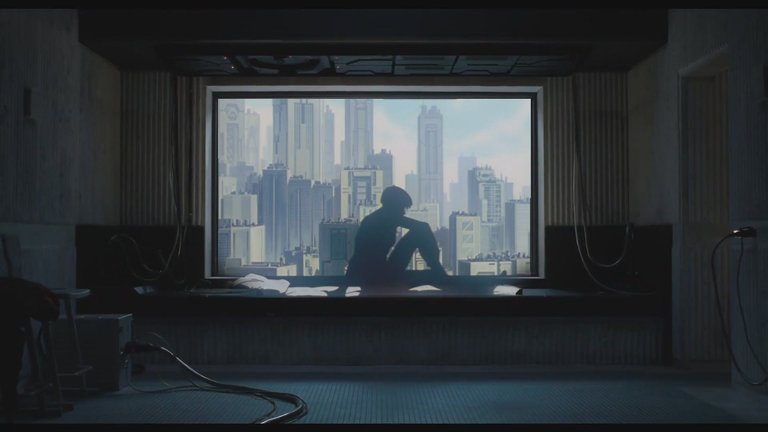
Ghost in the Shell is a dense treatise on philosophy hidden - or not so much - in the guise of a Japanese manga (and anime). Weapons, ships, cars, corporations, lights, plots and so on, are the shell covering a more elusive, ambiguous and thoughtful center. Again, a bit like Blade Runner. But if the work of Philip Dick and Ridely Scott influenced this film, the work of Mamoru Oshii and Masamune Shirow influenced another great science fiction saga that would see the light a few years after Ghost in the Shell and right at the end of the twentieth century, at the dawn of the new millennium: The Matrix.
Ghost in the Shell es un denso tratado de filosofía escondido - o no tanto - en la apariencia de un manga (y un anime) japonés. Las armas, las naves, los autos, las empresas, luces, complots y demás, son el caparazón que recubre un centro más inasible, ambiguo y reflexivo. De nuevo, un poco como Blade Runner. Pero si la obra de Philip Dick y Ridely Scott influenciaron esta película, el trabajo de Mamoru Oshii y Masamune Shirow influeció otra gran saga de ciencia ficción que vería la luz pocos años después de Ghost in the Shell y justo en los últimos tiempos del siglo XX, en los albores del nuevo milenio: The Matrix.
From the green text patterns on a black screen, to more specific details such as certain scenes of Trinity, the collective unconscious of the network, the way in which the characters connect to the Matrix with those cables behind their heads, or the famous shooting scene in which the protagonist duo protects themselves behind some stone pillars - among other things - all this reminds us of the famous film by the Wachowski sisters, who have recognized the influence of anime and the Cyberpunk aesthetics. The manga story continued in other manga and sequels were also made for the big screen plus a live action reboot with Scarlett Johansson (which was quite criticized by the most purist fans of the original manga), so the universe of Ghost in the Shell doesn't end with this 1995 movie, but as far as I'm concerned, I don't see the need to continue exploring the story of these characters, but to go deeper into the dilemmas and issues raised by the plot, for which I would like to see it again (it lasts less than an hour and a half) and write down phrases and questions as the film progresses and review them later. Now, what I do want to watch soon is that other famous cyberpunk style anime, Akira, taking advantage of it being available on MUBI and see what reflections it leaves me with. I'm not going to start reading manga now or watching more anime series, but I would like to explore what other movies like these are available to watch. I've already seen Perfect Blue and Paprika, wonderful influences for Aronofsky's and Nolan's masterpieces, but what other would you recommend I see? which of those is your favorite? what do you think of Ghost in the Shell? I'll read you in the comments.
Desde los patrones de texto verde sobre una pantalla negra, hasta detalles más específicos como ciertas escenas de Trinity, el inconsciente colectivo de la red, la forma en que los personajes se conectan a la Matriz con esos cables detrás de su cabeza, o la famosa escena del tiroteo en el que la dupla protagonista se protege detrás de unos pilares de piedra - además de otras cosas - todo eso recuerda a la famosa película de las hermanas Wachowski, quienes han reconocido la influencia del anime y de esa estética Cyberpunk. La historia del manga continuó en otros mangas y se hicieron también secuelas para la gran pantalla además de un reboot en live action con Scarlett Johansson (que fue bastante criticado por los fanáticos más puristas del manga original), con lo que el universo de Ghost in the Shell no acaba con esta película de 1995, pero en lo que a mí respecta no veo necesario seguir explorando la historia de estos personajes, sino seguir profundizando en los dilemas y los temas planteados por la trama, para lo cual me gustaría verla de nuevo (dura menos de una hora y media) e ir apuntando frases y preguntas a medida que avance la cinta y repasarlas luego. Ahora bien, lo que sí quiero ver pronto es ese otro anime famoso de estilo cyberpunk, Akira, aprovechando que está disponible en MUBI y ver qué reflexiones me deja. No voy a comenza a leer mangas ahora ni a ver más series de anime, pero sí me gustaría explorar que otras películas como estas están disponibles para ver. Ya he visto Perfect Blue y Paprika, maravillosas influencias para las obras maestras de Aronofsky y Nolan, pero ¿qué otra me recomendarían ver? ¿cuál de todas esas es su favorita? ¿qué opinan de Ghost in the Shell? Los leo en los comentarios.
Reviewed by | Reseñado por @cristiancaicedo
Other posts that may interest you | Otros posts que pueden interesarte:
 |
|---|

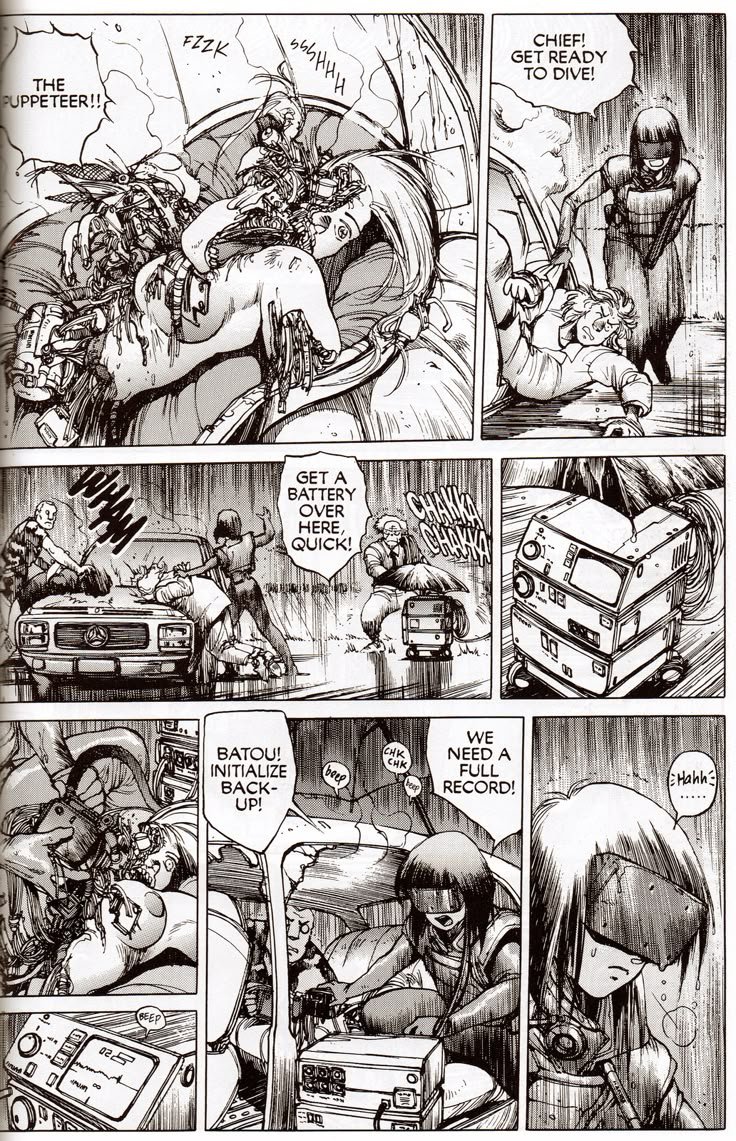
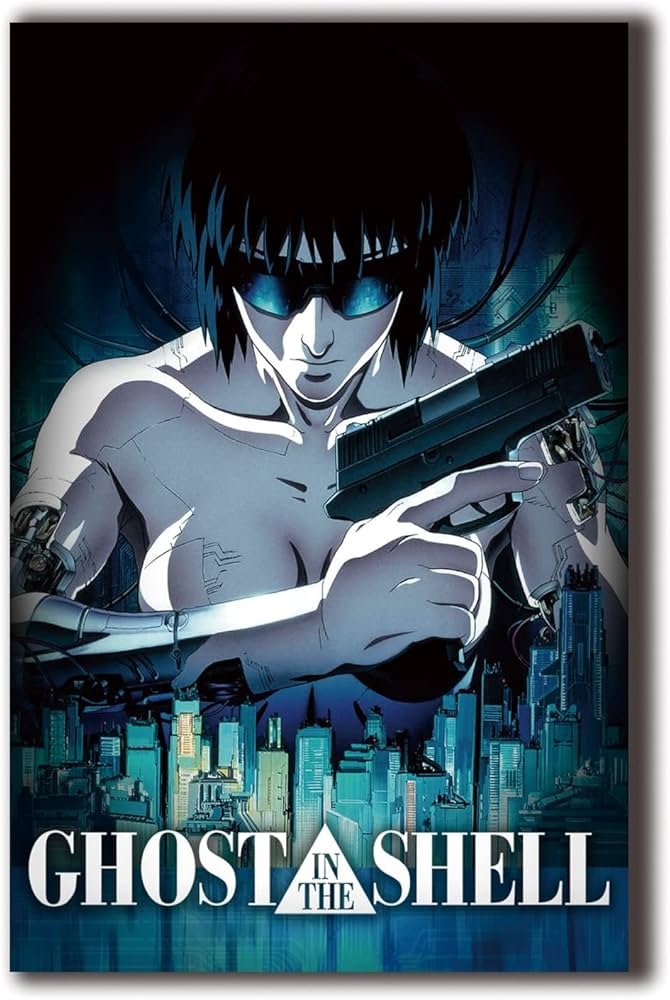
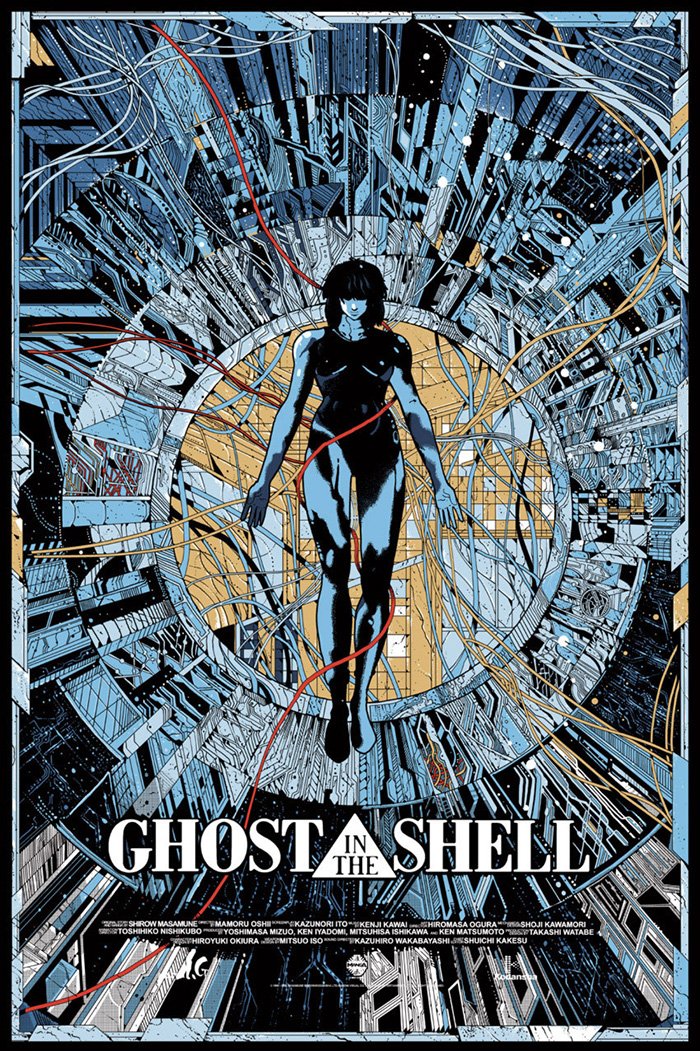
I love stories but some film industries are not doing well on narration of movies. Movies are something that we need focus on whenever we found ourselves on doing it.
What exactly am I saying? What I am trying to say is that let our story writers put more effort on their writing skills even though we understand that is not that easy. More grace to them though.
Saludos, excelente reseña. Akira es muy buena, ademas te recomiendo Appleseed que no es tan densa sino un poco mas ligera, pero también a mi parecer es buena. También la OVA de 1993 conocida en occidente como Battle Angel Alita, que consta de solo dos episodios y tiene una adaptación live action de Hollywood.